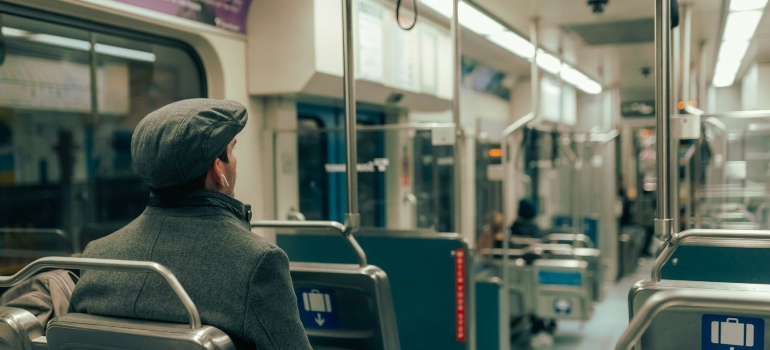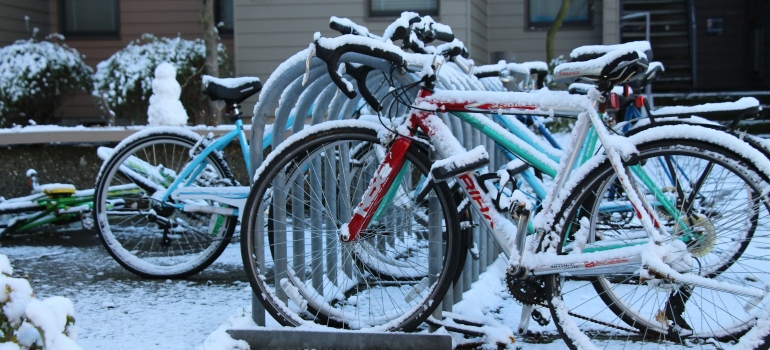Moving for College to Seattle 101
Seattle is known for its stunning natural beauty, innovative tech scene, rich cultural history, and vibrant academic institutions. Whether you’re heading to the University of Washington, Seattle University, or one of the city’s many other colleges, moving to Seattle for college can be both exciting and overwhelming. This Hansen Bros. Moving & Storage guide to moving for college to Seattle will help you navigate this transition by covering everything from housing and transportation to Seattle’s culture and climate.
1. Preparing for the Move
Moving for college to Seattle is a significant milestone, and being well-prepared can make the process smoother. Here’s what to do first:
- Admissions and Enrollment: Make sure all your admissions and financial aid documents are in order. Familiarize yourself with any specific deadlines or paperwork required by your college, like immunization records, housing contracts, and course registration.
- Housing Plans: If you’re planning to live on campus, ensure you’ve met all the deadlines for dormitory applications. If you’re living off-campus, begin your housing search early (more on that below). Seattle’s rental market can be competitive, especially near popular college neighborhoods.
- Transportation: Plan how you’ll transport your belongings. If you’re driving, plot out your route to Seattle. If you’re flying, consider sending large items to your new address with one of the best shipping companies Seattle has, and check what you can bring with you on the plane.
After handling these essential tasks, you’ll be well on your way to a successful move to Seattle. Taking care of the logistics early will allow you to focus on the excitement of starting your college journey in this vibrant city!

2. Finding Housing in Seattle
Seattle’s housing market is notorious for its high prices, but you can still find affordable student accommodations if you know where to look.
On-Campus Housing
Most universities in Seattle offer on-campus housing options for students, which can be convenient for those new to the area. The University of Washington, for example, has multiple dormitories that provide easy access to classes, dining halls, and social events. These residences typically come furnished, which can save you money on furniture and make move-in day less stressful.
Pros:
- Close proximity to classes.
- No need to worry about utilities or furniture.
- Easy access to student services and activities.
Cons:
- Less privacy compared to off-campus living.
- Dorm rules may restrict certain activities or appliances.
- Limited options after freshman year.
While on-campus housing offers convenience and community, it does come with certain limitations like reduced privacy and stricter rules. As you progress in your college experience, many students begin to explore off-campus housing options to gain more independence and flexibility.
Off-Campus Housing
Many students in Seattle opt for off-campus housing after their first year. Popular neighborhoods for students arriving with Washington movers include the U-District, Capitol Hill, Ballard, and Fremont. These areas have a mix of apartments, shared housing, and rental homes. Here are some tips for finding off-campus housing:
- Start Early: The rental market in Seattle is competitive, especially around the start of the academic year. Begin your search a few months before you plan to move.
- Set a Budget: Rent in Seattle can range widely depending on the neighborhood. Expect to pay between $1,200 and $2,500 for a one-bedroom apartment, with rent in central areas like Capitol Hill being on the higher end.
- Use Rental Websites: Websites like Zillow, Apartments.com, Craigslist, and university-specific housing portals can help you find listings.
- Consider Roommates: Sharing a house or apartment with roommates can make living in more expensive areas affordable. Many students also use Facebook groups or roommate-matching services to find compatible people to live with.
3. Getting Around Seattle
Seattle is known for its extensive public transportation network, which makes it easy to get around without a car:
- Link Light Rail: The Link Light Rail is a fast and reliable way to travel between neighborhoods and to major destinations like the University of Washington, Capitol Hill, downtown Seattle, and Sea-Tac Airport. Many students find it especially useful for commuting to and from campus.
- King County Metro Buses: Seattle’s bus system is comprehensive and connects the city’s many neighborhoods. If you’re living off-campus, you’ll likely use Metro buses to get to and from school. Make sure to get an ORCA card, which is a reusable transit card that works on buses, light rail, ferries, and other transit services in the Seattle area. Many universities offer discounted transit passes for students.
- Biking: Seattle is a bike-friendly city with bike lanes and trails that make it easy to get around without a car. The Burke-Gilman Trail, for example, runs through the University of Washington campus and connects several neighborhoods.
- Walking: Many students in Seattle walk or bike to their destinations. Seattle is a relatively compact city, and many neighborhoods near universities are walkable.
If you do plan to bring a car with one of the freight companies Seattle offers be aware that Seattle’s streets can be narrow and hilly, and parking is often limited. Additionally, parking permits for on-campus lots may be expensive, and street parking in popular areas is hard to come by. However, a car can be useful for exploring the Pacific Northwest’s many hiking trails and natural attractions.

4. Seattle’s Culture and Lifestyle
The city offers a unique combination of urban living and outdoor adventure, making it an attractive place for all moving for college to Seattle.
Tech and Innovation
Seattle is home to major tech companies like Amazon, Microsoft, and Google, which gives the city a forward-thinking, tech-savvy vibe. For college students, this also means many internships and job opportunities in the tech industry.
Coffee Culture
Seattle is famous for its coffee scene. The city is the birthplace of Starbucks, but it’s also known for its countless independent coffee shops, many of which double as great study spots. Some popular ones near campuses include Café Allegro in the U-District, Vivace on Capitol Hill, and Storyville Coffee in Pike Place Market.
Music and Arts
Seattle has a rich musical heritage, from its role in the rise of grunge in the 1990s to its vibrant indie and jazz scenes today. Live music venues like The Crocodile and Neumos frequently host up-and-coming artists. Additionally, Seattle’s art museums, such as the Seattle Art Museum and Frye Art Museum, offer opportunities for cultural enrichment.
Outdoor Activities
Seattle is surrounded by natural beauty, making it a great place for outdoor enthusiasts. From kayaking on Lake Union to hiking in the nearby Cascades, there’s no shortage of outdoor activities. The proximity to places like Mount Rainier, Olympic National Park, and the San Juan Islands means weekend adventures are easily accessible.
5. Seattle’s Climate: What to Expect
Seattle is notorious for its rainy reputation, but the reality is more nuanced. Yes, it does rain frequently, but it’s often light drizzle rather than heavy downpours. The rainiest months in Seattle are between October and April, so investing in a good rain jacket, waterproof boots, and an umbrella is essential. However, summers in Seattle are generally dry, sunny, and mild, with temperatures ranging from 70 to 80°F (21 to 27°C).
Seattle is known for its overcast skies, especially during the winter months. If you’re moving from a sunnier climate, the grey skies may take some getting used to. Seasonal Affective Disorder (SAD) can be common, so if you’re moving for college to Seattle, consider investing in a light therapy lamp or finding outdoor activities that keep you active during the winter.
While Seattle doesn’t get as much snow as other parts of the country, it does occasionally experience snowfall. When it does snow, the city can shut down, as the hills and lack of snowplows make driving difficult. Most of the time, though, winter is rainy and cool, with temperatures rarely dipping below freezing.

6. Financial Planning for Seattle
Seattle is one of the more expensive cities in the U.S., so budgeting and financial planning are crucial.
Tuition and Fees
Make sure you’re aware of all tuition fees, including out-of-state fees if applicable. Washington residents often qualify for in-state tuition, which can significantly reduce costs. Additionally, check with your school’s financial aid office for scholarship opportunities, work-study programs, or grants.
Living Expenses
The cost of living in Seattle is higher than the national average. As a student, it’s important to budget carefully for moving services in Seattle and be aware of the expenses you’ll encounter while living here. Here’s a rough breakdown of typical monthly expenses for a student living in Seattle:
- Rent: $1,200 – $2,500, depending on the neighborhood and whether you have roommates. Housing near campus or in popular areas like Capitol Hill tends to be pricier, but sharing a place with roommates can significantly lower your rent.
- Utilities: $100 – $200. This includes basics like electricity, water, internet, and sometimes heating. The costs will vary depending on your usage and the type of accommodation you live in, so it’s important to factor this into your budget.
- Groceries: $300 – $400. Seattle has many grocery stores, ranging from budget options like Trader Joe’s to higher-end stores like Whole Foods. Planning meals and shopping smart can help keep this expense manageable.
- Public Transportation: $60 – $120 for an ORCA pass (depending on your school’s discounts). If you rely on public transit, having an ORCA card is essential. Some universities offer reduced fare passes for students, so be sure to check with your school for any available discounts.
- Entertainment and Dining: $100 – $300, depending on your lifestyle. Seattle has a wide variety of affordable dining options, from food trucks to casual eateries, as well as numerous free or low-cost entertainment options like music events and outdoor activities.
Balancing these costs while in college will require thoughtful planning and budgeting, but with a clear understanding of where your money is going, and expert assistance from HB move management, you’ll be better prepared to enjoy your time in Seattle without financial stress.
7. Navigating College Life in Seattle
Seattle’s universities offer a wealth of academic resources, from libraries to tutoring centers. Make sure you’re aware of all the tools available to help you succeed academically. Most universities offer services to support students’ mental health, career development, and social engagement.
Moving to a new city can feel isolating at first, but getting involved on campus is one of the best ways to build a support system. Take advantage of counseling services, career workshops, and student organizations to stay connected and healthy. Or join student clubs, attend campus events, and explore Seattle’s diverse communities to meet people with similar interests!

8. Pro Tips for Thriving in Seattle
As you prepare for this exciting new chapter in Seattle, there are a few key insights that can help you adapt more smoothly to college life and the unique characteristics of the city:
- Embrace the Weather: Seattle’s rainy climate is part of its charm, and it’s something that defines the city’s atmosphere. While the grey skies and drizzle may take some getting used to, with the right gear—like a quality rain jacket and waterproof shoes—you’ll be able to enjoy the city year-round. Many locals embrace the rain rather than shy away from it, and with time, you’ll likely do the same.
- Explore the Outdoors: One of Seattle’s biggest draws is its proximity to nature. From the Cascade Mountains to Puget Sound, the opportunities for outdoor adventures are endless. Make sure to set aside time to explore the region’s stunning natural landscapes—it’s one of the best ways to de-stress from school.
- Stay Organized: Moving to a new city for college can be overwhelming, especially when it comes to managing your finances, housing arrangements, and academic workload. Create a budgeting plan, keep track of important dates and deadlines, and set up a schedule to help balance your academic and personal life.
- Be Open to New Experiences: Seattle is a vibrant and diverse city with an eclectic music scene, world-class museums, a wide range of cultural events, and always something new to discover. Whether it’s joining a new club, attending a local festival, or making friends from different backgrounds, these experiences will enrich your time in Seattle.
Keep these tips in mind, you’ll not only ease the process of settling into Seattle but also set yourself up for a fulfilling college experience, both academically and personally. Enjoy the adventure—Seattle is waiting for you!
Your Seattle Adventure Awaits!
Moving for college to Seattle is an exciting adventure filled with academic opportunities, cultural experiences, and outdoor activities. While the city’s weather and cost of living may require some adjustments, Seattle’s dynamic atmosphere and access to nature make it a fantastic place to call home during your college years. With careful planning, an open mind, and a sense of adventure, you can make the most of your time in the Emerald City.
Why Choose Us
History
Hansen Bros. Moving & Storage is locally owned and operated by the same family for four generations, since 1890. We have a well-established reputation for service quality and reliability with a high percentage of repeat household and commercial clients.
Professionalism
We’re a certified ProMover by the American Moving and Storage Association with A+ rating with the Better Business Bureau, voted “Best in Western Washington” in 2009 and from 2011 to 2016 by KING5. Our company is fully licensed and insured and member of WMC and AMSA.
Value
Hansen Bros. Moving & Storage provide free, no-obligation in-home estimate and competitive rates, including low minimum rates for shipments moving under 300 miles. We’ve set a refund policy for unused packing materials and three Puget Sound locations to help clients save on travel fee costs.



